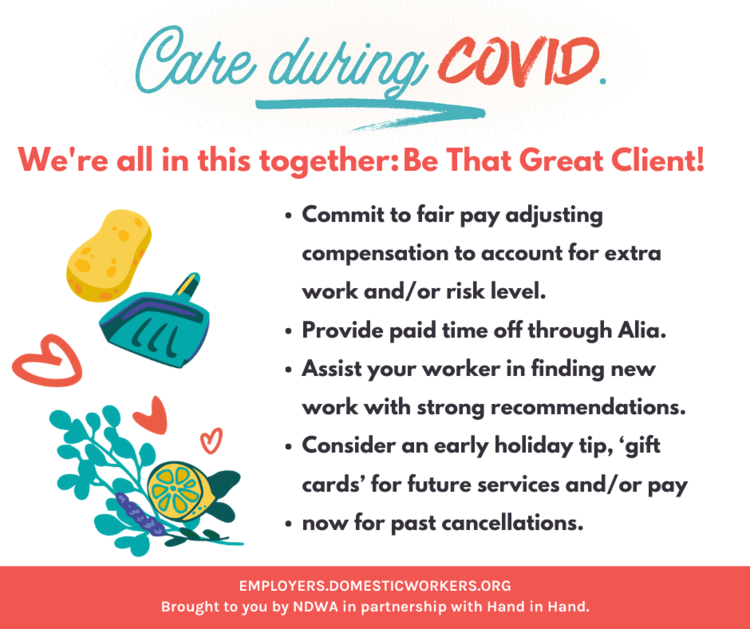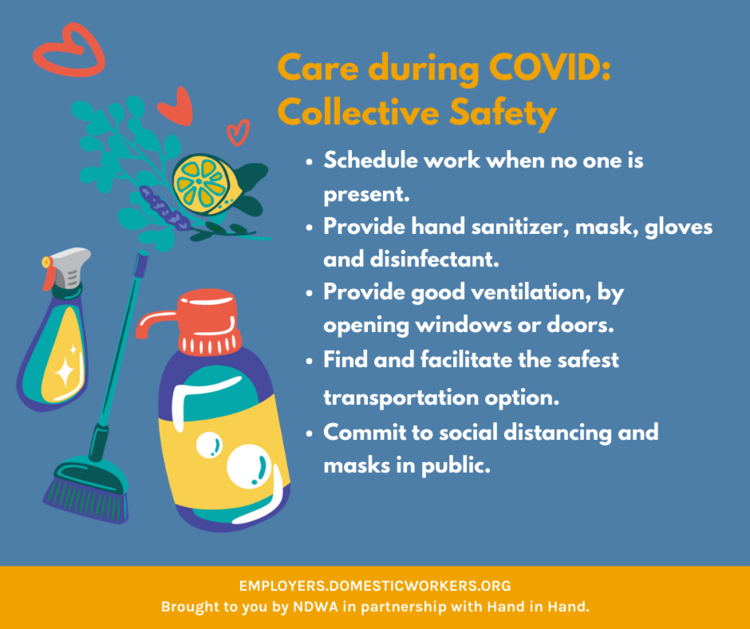“We should not have to be sacrificing our lives just to get through this crisis. Take care of us because we take care of you. We do this work from our hearts.”
—– Savvy Moore, a certified nursing assistant (CNA) from North Carolina who is currently driving people for medical transportation and is herself immunocompromised.
As states begin to reopen across the country, essential workers and those on the frontlines of COVID-19 have declared the need for an increase in government assistance and workplace protections.

On May 27, the National Domestic Workers Alliance (NDWA) held a press call to discuss the ways in which employers, federal and state governments, can ensure that caregivers and home care workers are protected.
The call also featured three domestic workers, all women of color, who expressed concern that reopening states too soon will endanger lives—not only of home care workers but also of their clients and families.
Susie Rivera, a home care worker from Texas working 40 hours a week while providing for a household of five, spoke about the many hats she must wear:
“As a home care worker, you are more than that. We are a social worker, we’re a therapist, and we’re so much more…
“I worry about passing this coronavirus on to my clients that I care for. I also worry about passing it on to my wife and family. I really feel, right now, that I’m getting burnt out. Because I’m getting more and more calls to help our elderly, because these people, the elderly, are not feeling safe since Texas has reopened. I’m worrying myself thin. I am working less hours, but now it’s more stressful.
“All the years that I’ve done this kind of work, I have never ever ever dreamt of having to work the way we have to work right now. I don’t have the equipment I need.
“We have always been essential. Even before the pandemic, I considered ourselves essential workers… We are essential workers. And we need to be there, we’re on the frontlines. And if you ask any of the patients and clients that I’ve taken care of, their family will tell you that we are essential workers.”
Ai-jen Poo, executive director of NDWA, spoke about the need to protect the lives of domestic workers: “The COVID-19 crisis has been a crisis of impossible choices for our workforce, which has long been invisible and under-valued.”
She spoke in solidarity with domestic workers and promised that NDWA will continue to push for fairness and dignity in the domestic workforce for those who have been working in the margins for far too long.
Poo went on to explain how many domestic workers have continued to work through the crisis, despite threats to their family, clients and their own health and well-being. Many have been working in homes without adequate personal protective equipment (PPE), access to health care or continued job security.
The average annual income for a home care worker was just above $16,000 per year before COVID-19. Now, many of them are struggling to find half the amount of work they were taking on before the virus hit.
Linda Walton, a home care worker from Georgia currently caring for someone with a spinal injury, spoke about hazardous work conditions since COVID-19:
“When the coronavirus hit, the agency where I worked went on with business as usual. They did not discuss anything about the Coronavirus or provide any type of PPE. When the agency received a call from a family whose loved one tested positive for COVID-19, then they offered us PPE.
“If we agree to take COVID-19 cases, we are not offered any hazardous pay, during this time, and we also do not have any health insurance or sick leave. Many of our hours have decreased significantly since the pandemic has happened and I could have worked more hours but I could not risk my health, caring for clients who were COVID-19 positive. I need to take care of my health, and I am also concerned for the health of my client, because they are medically fragile and have pre-existing health conditions. Luckily, my client provides gloves and hand sanitizers, when I care for him.
“Since Atlanta has reopened, it has been really stressful. I would hear from our governor that things are getting better, but that does not match up with our reality. Our positive cases have almost doubled since the state has reopened. We almost have 43,000 people who have tested positive.
”As a frontline worker performing an essential job and as a woman of color, I feel like I’m more at risk for contracting the virus. When you’re caring for the state’s most vulnerable residents, as a CNA, sometimes the work is undervalued, but we know it’s essential. We’re on the frontlines of this virus, and we need to be cared for and protected so that we can continue caring for the most vulnerable residents.
“We absolutely need hazardous pay, PPE, sick leave and health insurance.”
Poo emphasized although states have begun to reopen, governments and individuals must be aware that the country is still in a public health and economic crisis. Information about the symptoms, cure and contagiousness of the virus are still relatively unknown. Until a vaccine is developed, she said, we must all act as if the crisis is in no way close to being over. The decision of states to reopen must rely on the state and federal government’s ability to provide in-depth guidelines about how everyone—both employers and employees—can be protected in their homes and at work.
In response to the alarming lack of guidelines regarding how to protect clients and domestic workers, NDWA has put together suggestions and resources for employees and employers. Poo emphasized the importance of following what NDWA calls the “4 C’s” in order to stay safe—careful, communicative, collaborative and compassion.

She emphasized that all households that employ domestic workers should have protective gear, hazard pay, and clear, explicit agreements regarding contact between the client and home care worker. There are always power dynamics at play, Poo said, and asked employers to consider the pressure these workers are under to continue to provide for their own families.

Finally, Poo and Haeyoung Yoon, senior director of policy at NDWA, emphasized how critical is it for the government to advocate for more health regulations and protective equipment for essential workers, including domestic workers, stating nothing is “more essential” than leadership on the national level.
In addition, both of them talked in detail about the importance of passing the HEROES Act that was recently passed in the House of Representatives. This bill, if passed, would create pandemic premium pay for workers who have continued to work through the crisis. It would also retroactively pay immigrant families who were intentionally excluded from the CARES Act, the previous relief package.
In order for essential workers across the country to continue to ensure the health and well-being of the elderly and those in need of care, politicians must keep base policy on CDC expertise. They must also make sure to include guidelines that prevent employers from retaliating against workers who stay home because of COVID-19 related reasons.
We will only survive this crisis if everyone works together to prioritize everyone else’s health and well-being alongside their own—starting with our most vulnerable.





